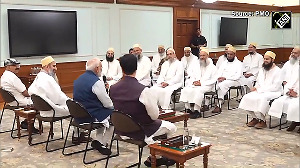Satyam Computer Services founder B Ramalinga Raju, while confessing to the accounting fraud on January 7, said that he was prepared to subject himself to the "laws of the land and face consequences thereof".
Ironically, the laws of the land seem to have given him breathing time from the interrogation of various investigation agencies, which plunged into action soon after the Rs 7,800 crore (Rs 78 billion) scam was exposed.
Raju and his brother B Rama Raju were arrested on January 9 by the Andhra Pradesh Crime Investigation Department. According to the laws of the land, the CID produced the duo before the Nampally court, which remanded them to judicial custody.
While court orders gave time for the Raju brothers to cool their heels in the Chanchalguda Central Prison and recoup their senses, it made the investigating agencies wait for weeks to interrogate them or even to record their statements.
Once an accused is in judicial custody, all investigating agencies, including the Central Bureau of Investigation, have to obtain the court's permission to interrogate him.
The same law applies to the Securities and Exchange Board of India, Serious Fraud Investigation Organisation, Enforcement Directorate, Income Tax Department and other organisations that are out to probe the Satyam fraud case.
And, it had not been an easy task for these organisations to obtain the court's permission. In fact, the counsels of Sebi once alleged that their investigations into the Satyam scandal were being hampered.
The regulatory authority "is finding it difficult to obtain a court order" each time it wants to question Raju brother, they said.
The desperation of the investigating agencies to get to the Rajus to question them can be gauged from what happened to Sebi. The regulatory authority's plea for questioning the accused was dismissed by the VI additional chief metropolitan magistrate on January 23, citing non maintainable grounds and jurisdiction reasons.
Sebi then approached the Andhra Pradesh High Court, which posted the plea for hearing for February 9. It rejected the request of Sebi's advocate, Solicitor-General Goolam E Vahanvati, to allow interim interrogation of the accused.
Vahanvati said the present instance was an extraordinary circumstance and the delay in investigation would have an impact on the shareholders.
Sebi did not seek any custody of the accused but would interrogate them wherever permitted, he pointed out, but could not obtain a favourable order.
Ultimately, Sebi approached the Supreme Court, which conceded Vahanavati's plea. At last, 25 days after the Raju brothers were sent to judicial custody, Sebi was able to interrogate them for three days from February 4.
Similarly, the Nampally court returned the application of SFIO on January 30, citing non-maintainability of the plea. It asked SFIO counsel to re-petition after Sebi's plea was heard by the high court. Finally, SFIO was able to record the statements of the accused on February 15.
The Income Tax Department, CBI and Institute of Chartered Accounts of India also have to wait for the court's permission to question the Rajus or other accused in the case, including former chief financial officer Srinivas Vadlamani and Price Waterhouse auditors S Gopalakrishnan and Srinivas Talluri.
This is not to say that there has been any deliberate delay in allowing the investigating agencies to interrogate.
The court procedures are like this. A petition has to be filed and time has to be given for the defence counsel to file a counter petition. The arguments of both sides have to be heard and the judge has to examine the merits of pleas made before he gives judgement. All this takes time.
On the other hand, the Hyderabad district collector and magistrate, Navin Mittal, has provided Ramalinga Raju the status of "Special Class Under Trial Prisoner".
"The special class classification has been approved keeping in view the social status, education and habit of life," Mittal stated in his order.
Raju filed an application seeking special status under Rule 730 of AP Prisons Rules 1979. The VI additional chief metropolitan magistrate has recommended the classification and has forwarded the petition of Raju to the collector for his approval and review.
Special class is designated as "C" class. Under the "C" class, Raju will be provided a cot (to be used in the same place as before) and will be supplied with utensils and a gas stove to cook for himself.








 © 2025
© 2025